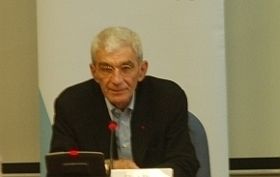


The Greek Crisis – Storydoc

How to interpret and convey the Greek crisis in a documentary? How to go from the reportage and the news clip to an understanding of how the population sees and feels the dramatic development in the country where stood the craddle of civilisation…?
Dimitris Athiridis had followed the kharismatic, 68 year old Yiannis Boutrasis (photo) during his campaign to become mayor of Thessaloniki. The man is fantastic and the film captures him in his private sphere, an alcoholic who stopped drinking decades ago, a man with controversial plans like naming a street in his city ”Kemal Atatyrk”, a man who is another kind of politician than all the others, who are not trusted by the population. There is potential for a strong film that can travel, no doubt about that.
Another Demetri, with the last name Sofianopoulos, had chosen to have a dog as storyteller in a project that also has potential internationally. Sofianopoulos and ”Thanassis alias Bruno”, the dog, and the working title of the film, goes from a safe home in the rich area, where the good life was there for man and dog, to the suburbs where food is to be found among garbage and to central Athens where riots are unfolded. To take a look a look on the crisis through a DogUmentary is very cleverly thought.
Thirdly a project that was not specifically meant to be a description of the crisis was presented by Nina Maria Paschalidou and Nikos Katsaounis. Titled The Prism GR2011 this no-funding completed multimedia initiative also indirectly deals with the crisis. The two filmmakers took part in the idfa doclab this year. This is the intro text from that site:
The Prism Greece 2011 is an online platform containing 27 multimedial films which gauge the mood in Greece in the midst of a financial and social meltdown during the winter of 2010-2011.
Starting from stormy Athens, 14 journalists went around the country, from the border with Turkey to the highest mountain in central Greece to the inhospitable mountains of southern Crete. The result is a colorful mosaic of mini-documentaries that can be clicked on by theme, filmmaker or geographic location on the simple, accessible site. The somewhat inconsistent quality of the films can be explained by the fact that the initiators and financiers, Nikos Katsaounis and Nina Paschalidou, chose to retrain photojournalists as “multimedial storytellers”. Experienced or not, their films reveal everything traditional media ignore. For instance, Riders on the Storm follows a group that ventures around Athens on a sophisticated bicycle and offers an alternative for the future in the process. And Radical Youth documents the rise of radical left-wing youngsters who take the law into their own hands with Molotov cocktails. Strikingly enough, this last film wasn’t made by a Greek, but rather a young Spaniard who joined in on the project shortly after his arrival.